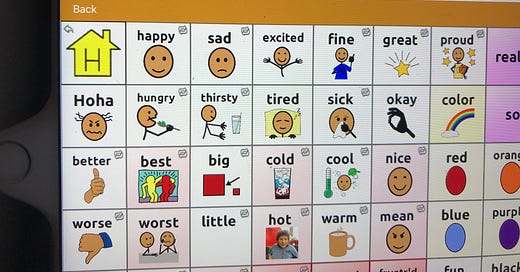In a week where one news reported that Artificial Intelligence (AI) can now write in te reo Māori, another huge advance in technology that will benefit Tangata Whaikaha and Assistive Technology users in Aotearoa was announced, with little fanfare.
According to Stuff website, “Te Puni Kōkiri, the Government’s policy adviser on Māori wellbeing and development, is working with Wahanga Tū Kōrero – The TalkLink Trust and Te Hiku Media to undertake a feasibility study from June to September 2023.
The study will work out the technical requirements required to create a te reo Māori voice for assistive technology devices.
Te Puni Kōkiri investment director Karen McGuinness said supporting the growth of a healthy and vibrant te reo Māori me ōna tikanga was a key focus.
"It also enhances the Government’s Maihi Karauna strategy, which aims to have 1 million New Zealanders speaking at least basic te reo Māori by 2040,” she said.
“We want to see te reo Māori thrive as a living language with people across the motu.
“This means that it is valued, learned, and used by Aotearoa whānui [wider New Zealand] in a full range of contexts and environments.”
Te Puni Kokiri is working with agencies to support funding for phase two of the project which is developing the voice.”
Well whoop whoop, sound the the alarm, fire the confetti cannon, grab your pom poms and put on your dancing shoes, I for one am here to celebrate this groundbreaking, life changing announcement! 🎉 💃 🪩 🕺 🎊
This is a huge step in the right direction towards a future with Assistive Technology that not only reflects our indigenous language in Aotearoa, but it empowers users to speak te reo with no fear of sounding like a sat nav system any more.
I remember back in 2019 curiously attending a webinar by Brynlea Collin Stone, a SLT who was presenting her masters thesis ‘Ko tōku reo tōku oho oho: towards culturally located te reo Māori AAC’ and being absolutely blown away by
-the inequity of access to Assistive Technology for tangata whaikaha
-the act of ‘re-colonisation’ in whaikaha maori forced to use AAC in English as there was no te reo Māori option
-the need for culturally responsive AAC to reflect our commitment as te tiriti partners.
Also it just makes sense to pronounce names, places and words in our community correctly!
I’ve been very vocal in the past of my dream for Sophia to be able to recite her pepeha with her ‘big voice’ (AAC) confidently and without shame at the pronunciation. Every time I introduce myself in a hui, I talk about this because it is key to my identity as Sophia’s māmā and more importantly as her ally.
I’ve also made no secret of my dislike of having to type out phonetically Kupu Māori to enable AAC to sound remotely correct. It's a time-consuming and disenchanting experience, but it’s necessary. AAC doesn’t recognise long vowel sounds with a macron, rolling R’s or the difference between a ‘F’ or ‘Wh’ in kupu like Whaikaha, which can be pronounced differently depending on which tribal dialect you use.
Just yesterday I spotted the word ‘hoha’ programmed into Sophia’s AAC by someone at school. This is an important word for her to describe her mood, which as a non-speaker can sometimes be missed or incorrectly identified as something else and lead to distress.
Hoha had to be phonetically entered on her AAC by a teacher as ‘Whore Ha.’
I had a good laugh at that one. Not quite as good as the google auto-subtitles that described an online Education resource for teachers as “Tea Farty Key” (Te Whāriki) in a hui I was at the other day, but amusing all the same 😂
I want to acknowledge and celebrate the years of mahi led by Geneva Hakaraia-Tino, Tua o te Pae, and Talklink Trust. I’m so happy that their perseverance has finally paid off. Their patient and thoughtful advocacy for a te reo Māori function for AAC has created safe spaces for conversations around equity and access, as well as the impacts of colonisation on disability supports for non-speaking tangata whaikaha. Tautoko also to Te Puni Kōkiri and Te Hiku Media, plus tangata whaikaha and whanau who have added their voice to the conversation bringing about change 💜
After the initial feasibility study, work can (finally) start on developing a synthetic voice in te reo. I even have a wish list for voices to get them on their way:
Stacey Morrison has always been my #1 choice
I don’t know her name but ‘Geo’ from TV show Ahikāroa has the sass I’d expect Sophia to speak in
I once saw Roimata Fox in a play called ‘Witi’s Wāhine’ and she was breathtaking and had such strength in her voice
Debbie Ngarewa-Packer would be so cool too!
Mihingarangi Forbes … Dr Farah Palmer… Marama Davidson… gosh so many great choices.
That’s a bit of a whimsical tangent to end on, but wow it feels good to have options. Daring to dream of Sophia’s voice reflecting her tipuna, her iwi, her culture feels amazing.
Bye Felicia, Sat Nav, Siri & Alexa sounding voice. Hello Wahine Toa!




I love your list and there is the ability in AI text to speech to generate a voice for Sophia that is hers, and could be hers alone, one of the small humans in my life is also non-speaking and we are just at the beginning of our AAC journey butt I would love him to be able to use a voice that he felt was his instead of a generic oddly robotic Aussie kid.